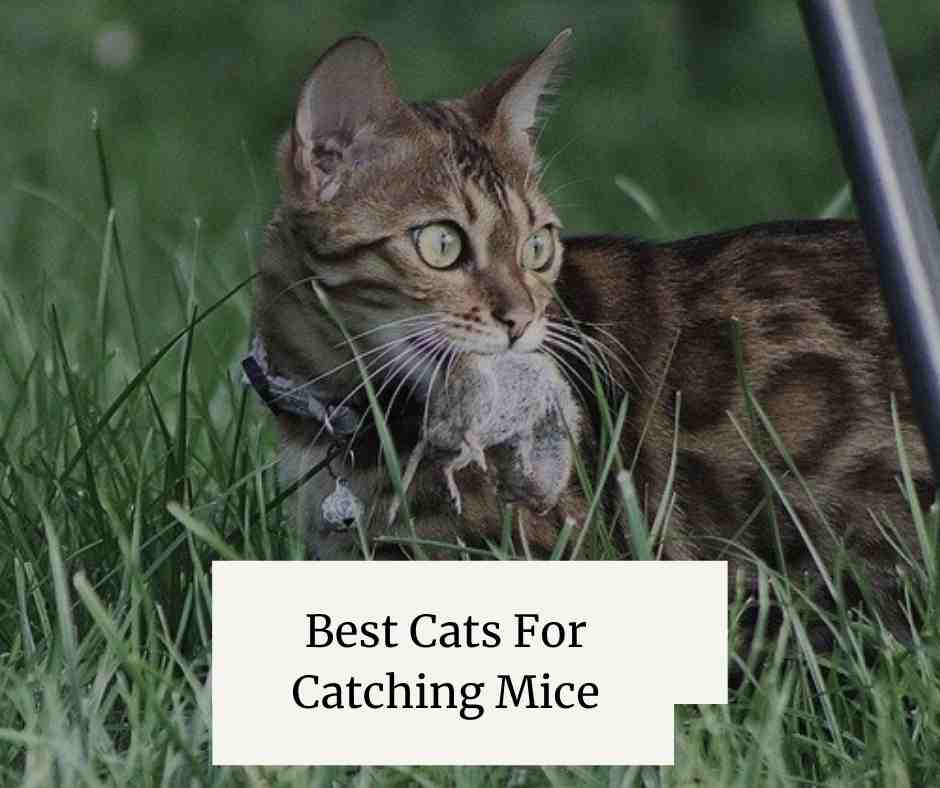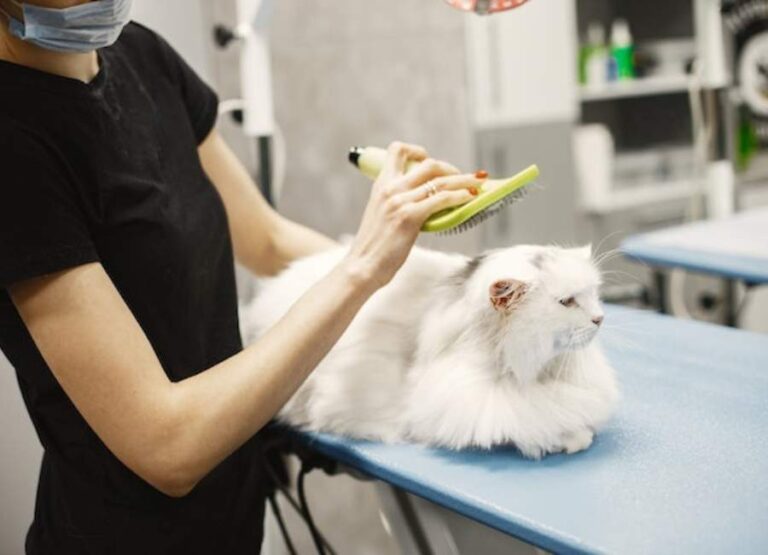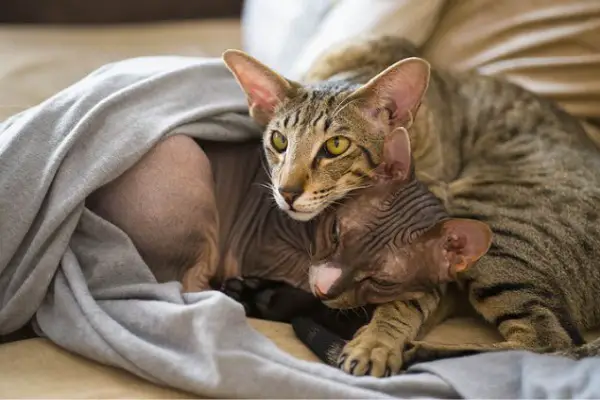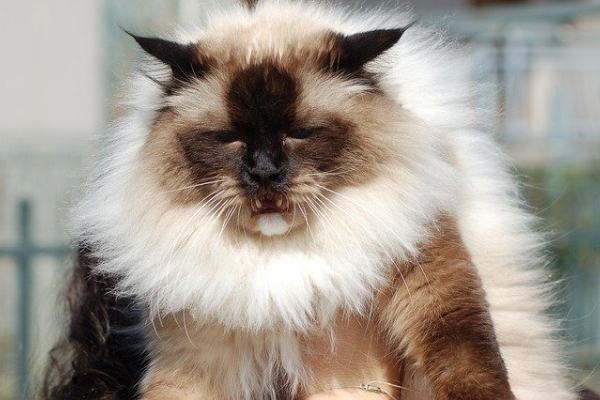10 Best Cats For Catching Mice You Should Know

Are you tired of pesky mice invading your home? If you’re a cat person, we’ve got you covered!
In this post, we’ll be discussing the best cats for catching mice.
Not all cats are created equal when it comes to their hunting prowess, so keep reading to find out which feline friends are the top contenders for keeping your home mouse-free.
Best Cats For Catching Mice
Here is the list of the best breed of cats for catching and keeping rats away from your property;
1. The Siamese Cat
The Siamese cat is a popular breed of cat that was believed to have originated in Thailand around the 14th century.
Siamese cats are high jumpers and love heights, so scratching posts, perches, and scratching posts should be provided at an early stage.
Siamese cats love to play, which is why they value toys. So make sure you have enough toys around the house.
Siamese is very curious but tends to be intelligent and demanding.
To keep your Siamese cat happy, busy, and trouble-free, give them a puzzle toy that will get them thinking and moving to share a treat or a conversation.
The Siamese cat is a natural hunting cat with lots of hunting instincts and is the best for hunting mice or keeping mice away from your home.
Find out some pros and cons of owning a Siamese cat.
2. The Bengal Cat
The Bengal is a domestic cat with the distinctive physical features of a small wild cat that lives in the forest and with the temperament of a loving and dependable family pet.
The Bengal cat is recognized as a breed by the International Cat Association (TICA).
However, this Association of Cat Lovers does not accept the Bengal as a breed for show competitions.
Find out some common pros and cons of owning a Bengal cat.
Bengal cats are very active and spirited and can hunt many times a day. They can keep mice away from your home.
Find out how long it takes a cat to catch a mouse.
3. American Shorthair Cat
The American Shorthairs are surprisingly muscular and strong – a trait formed over years of hunting for rodents on ships. American Shorthair tends to remain active and playful into old age.
American Shorthair has a thick coat that gets thicker in winter and comes in different colors and patterns, and this breed is one of the most popular pedigreed cat breeds in North America.
4. Burmese Cat
Burmese are active, curious, and adaptable to change. However, as they get older, some Burmese may become a little calmer and prefer to watch rather than engage in activities.
Burmese cats are very comfortable with other Burmese breeds, but may not be compatible with other breeds.
Burmese are good climbers and jumpers and should have a scratch posts and perches.
Burmese cats are healthy and stocky cats, and their diet should be monitored to prevent obesity, especially if the cat is not getting enough exercise.
5. Siberian Cat
The Siberian cat has an adorable personality – friendly, friendly, and energetic and this personality makes them an excellent feline companion who will meet and greet you at the door and follow you through the house.
Siberian cats are relatively calm cats, they love to talk through meows, shakes, and tweets that are sweet and melodious.
6. Persian Cat
A decent and submissive cat, the Persian cat is also known to be calm and cute.
The Persian cat is also a calm and peaceful cat breed, the Persian cat has great respect for its owner.
Persians have incredibly thick coats when compared to other breeds of cats.
It is important to note that Persian cats made their way to America around 1900. And can be used to keep mice away from your home.
Find out more about the pros and cons of owning a Persian cat.
7. Abyssinian Cat
The Abyssinian cat is a courageous, curious, and playful cat and also one of the oldest known breeds of cat.
The Abyssinian cat is also one of the most popular breeds of cats around the world. And can be used to keep mice away from home.
8. Norwegian Forest Cat
The Norwegian Forest cat is a breed of domestic cat originating in Northern Europe.
Norwegian forest cat is primarily a native to Norway, and has traveled around the world hence is now among the most popular breed of cat.
Norwegian forest cat is satisfied to be in the same room with people and will entertain themselves if no one is home, this breed is also an athletic cat and is seen as a climber.
9. Maine Coon Cat
The Maine Coon is the largest of all cat breeds and has a strong muscular build and large legs.
The head has a square muzzle and large ears that are held wide and high. Its fur is long and thick and consists of a primer covered with a very glossy waterproof coating.
The ancestor of the Maine Coon cat is the long-haired fur that was brought to Maine, America by sailors in the 1850s.
This cat which was brought by the sailors to mate with a local shorthair cat is a large, well-built cat with half-length hair and a brush-like tail that resembles that of a raccoon, hence the name it Maine Coon.
Find out some common pros and cons of owning a Maine Coon cat.
10. Savannah Cat
Savannah cat comes in different generations, and the Savannah cat is a hybrid cat breed.
For example, we will take the average height of F1 as the lower height and the average of height of the F5 as the highest height.
This will apply in comparing the weight, length, and height.
- F1 = 57% Serval (one parent will be a serval)
- F2 = 35% Serval (one grandparent will be a serval)
- F3 = 21% Serval (one great-grandparent will be a serval)
- F4 = 16% Serval (one great great-grandparent will be a serval)
- F5 = 11% Serval (one great, great great-grandparent will be a serval).
We have listed the best top 10 breeds of cats for hunting a mouse, but these cats have different personalities.
We moved further in our research to narrow the list down just to make it easy for you to pick one out of the 10 breeds
From our research results, we can tell you the best cat for hunting, catching, or keeping away a mouse is the Siamese cat.
In case you can not get a Siamese cat in your location, you can get Bengal, Maine Coon, American Shorthair, or Siberian as an alternative.
We picked the Bengal, Siamese, Maine Coon, and American Shorthair based on their energy level and their aggressiveness toward mice.
Rats do not mess around your property if you have any of the 4 listed cats.
Can my cat get sick from catching a mouse?
Yes, your cat can get sick from catching a mouse because mice are rodents that carry parasites, worms, fleas, and other forms of diseases that can infect your cat and get your cat sick.
Most cats can still get sick even if they do not eat a mouse they catch, because most of these mice have these diseases, parasites, or worms in their body.
A little tip here is that how your cat can get these parasites is simple, so let us outline it;
How a mouse can transfer diseases to a cat
Here are simple ways your cat can get infected from hunting a mouse:
- Your cat can cross the nest of an infected mouse and get infected as well
- Your cat can eat an infected mouse and get sick
- A cat will get infected if the cat touches an infected mouse even without eating it
- A cat can get sick from eating a leftover mouse that it did not finish previously
- Your cat can get sick from sleeping or resting in the same spot an infected mouse rested
- Your cat can get sick from touching or eating food an infected mouse played with.
- Cats hunt mice even in dirty paths and your cat can get sick from walking on an infected path.
How to protect your cat from getting sick after hunting a mouse
Here are some simple things to do when you notice your indoor cat ate a mouse:
- The basic thing to do is to try as much as you can to keep your cat away from a mouse.
- Mouse-proof your home
- Bath your cat with warm water
- Get immune boosters for your cat
- Reward your cat from staying away from hunting and eating mouses
- Close all entrance and exit routes of a mouse
My cat caught a mouse, and it’s still alive
This is a subjective topic that many people have different views about, some people will tell you that allowing your cat to hunt a mouse.
While others will tell you it’s a bad idea to allow your cat to hunt a mouse.
From experience, we can tell you that each time your cat catches a mouse you should do your best to take away the mouse from your cat.
This is because mice carry lots of diseases, worms, and parasites that can get your cat sick.
If your cat catches a mouse, and it’s still alive, try to distract your cat’s attention and take away the cat.
Because when your cat gets sick, you spend money and time.
Disadvantages of allowing your cat to be with a live mouse
- You spend more money healing your cat when it gets sick.
- The mouse can transfer worms to your cat.
- Your cat can get ticks or fleas from the mouse.
- An infected mouse can get your cat sick.
- A parasite can be transferred to your cat.
- Your cat will always want to go outside to catch more mice.
- Your cat can get lost from hunting more mice.
- Your cat can get trapped and taken away while hunting more mice.
- Your cat may mess up your house by playing with the mouse.
- You can get sick if the mice are infected.
What to do when your cat catches a mouse
Here is what to do when your cat catches a mouse:
- Encourage your cat not to go after mice.
- Distract your cat from the mouse.
- Take the mouse to your backyard and dig a hole, cover the mouse well.
- Reward your cat for allowing you to take the mouse away.
- Give your cat interactive toys when you take the mouse away.
- Wear gloves to protect against parasites, then clean up the place your cat dropped the mouse.
- Close all entrance routes for cats.
- Do not beat up your cat.
- Do not shout at your cat, be calm because your cat reads your energy level.
- Cuddle your cat and start cat games to allow your cat to forget the event.
How long do cats play with mice before killing them?
A cat can play with a mouse for an average of less than 1 hour before killing it, there is no specific time.
Most times cats play with a mouse for fun before killing it.
It is not good for you to allow your cat to play with a mouse, because the mouse carries a host of parasites.
Make sure you do not allow your cat to have access to a mouse, if your cat catches a mouse talk to your vet.
Do not think it’s alright for your cat to catch a mouse, if your cat must catch a mouse then get immune boosters.
How do cats catch a mouse?
Here are the four basic methods a cat uses to catch a mouse;
- Sit, Wait, And Pounce Method.
- Run and Pounce Method.
- Stalk and Pounce Method.
- Stationary and Pounce Method.
FAQs
Here are some frequently asked questions about cats catching a mouse;
Is it bad for my cat to catch mice?
Yes, it’s bad for your cat to catch mice because the mouse carries lots of parasites, worms, fleas, ticks, and diseases.
If you must allow your cat to hunt mice, then you should get immune boosters from your vet.
Not all mice are infected, that is why most outdoor cats feed on mice and still stay healthy.
How good are cats at catching mice?
Cats are so good at catching mice that you can use cats to keep mice away from your home.
Mice are the primary prey for cats, where ever cat lives mice do not come close as cats will use them as food.
Cats are wonderful at catching mice because they have developed unique skills in catching a mouse over the years.
Will mice leave if they smell a cat?
Yes, mice will leave once they get the smell or sound of a cat within an environment. Mice can smell cat urine.
A mouse knows its life is in danger when the mouse smells a cat’s urine.
When a mouse smells a cat it will run away and it takes time before such a mouse crosses that path again.
Mice are always afraid of any home that has a cat.
Do mice know if you have cats?
Yes, mice know you have a cat because a mouse can smell cats as their predator.
A mouse will make its research about your home at night before entering.
If a mouse smells a cat around your home, the mice are done with such a home.
Can a cat die if it eats a poisoned mouse?
Yes, a cat will die if it eats a poisoned mouse, however, a cat can still survive if you rush the cat to the vet before the poison acts.
If your cat eats a poisoned mouse, the mouse will transfer the poison to the cat, and poisons have a lethal effect on every living thing.
Can my cat get sick from killing a mouse?
Yes, your cat can get sick from killing a mouse if the mouse is infected or has worms, fleas, ticks, or parasites.
Here are some interesting topics:
- Where Do Feral Cats Sleep: 9 Places You Should Know & More.
- 12 Top Things That Scare Cats You Should Know & Avoid.
- Can Cats Eat Raw Meat: What Owners Said About Raw Meat.
Why you should not use indoor cats to keep mice away
- Mice can transfer worms to your cat.
- You spend more money on healing your cat when it gets sick from eating mice.
- An infected mouse can transfer fleas and ticks to your cat.
- Mice host parasites that can be transferred to your cat.
- Your cat can get lost or trapped while chasing a mouse.
Many will tell you is okay for your cat to catch a mouse but, we will tell you is wrong because your cat can get sick from catching a mouse.


![How Big Do Bengal Cats Get [6 Growth Stages] How Big Do Bengal Cats Get](https://petcreeks.com/wp-content/uploads/2021/07/How-Big-Do-Bengal-Cats-Get-768x644.jpg)



![When Do Cats Sleep The Most [Answered] When Do Cats Sleep The Most](https://petcreeks.com/wp-content/uploads/2023/10/keenan-barber-M7GJFakZObA-unsplash.jpg)